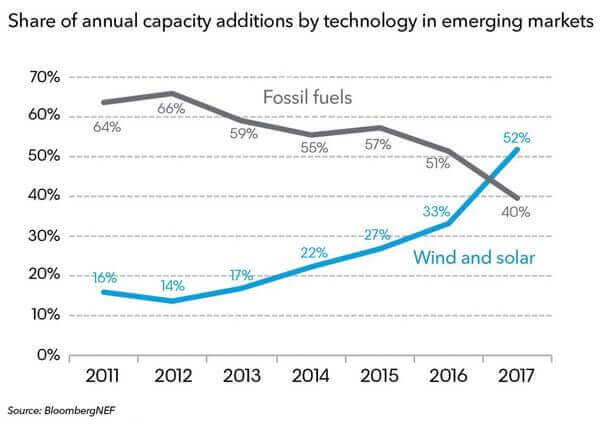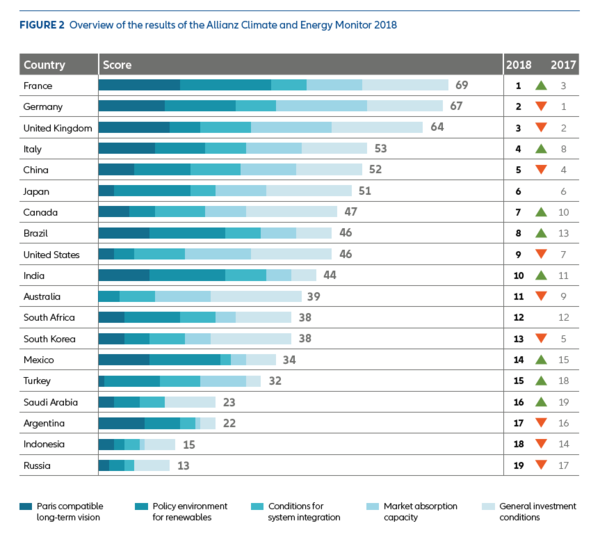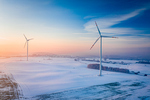News Release from windfair.net
Wind Industry Profile of
Developing Countries Increasingly Take the Lead in Renewable Energy Development
The G20 are struggling to make the transition to renewable energy (as Windfair reported recently). After an initial sharp increase in solar and wind expansion, grid expansion and the necessary sector coupling to actually achieve the climate protection targets laid down in the Paris Climate Agreement are now often hampered.
Germany is currently at the inglorious centre of this development because the so-called coal commission is still unable to present any results on a coal phasing out for the country. The fact that the mood in the economy has been deteriorating for some time, however, is shown by figures of the new Allianz Climate and Energy Monitor. On the basis of the investments in 2017, Germany is losing its top position as the most attractive G20 market for renewable energy to France. With Great Britain in third and Italy in fourth place, the European markets still lead the G20 countries though.
"Renewable energies in France, Germany and the UK are benefiting from good market and investment conditions in general as well as from a largely positive political environment. However, there are still weaknesses even in the best-performing countries: France's tenders for new plants, for example, do not have enough bidders, Germany’s investment in wind will drop due to new auctioning rules, and the solar energy market in the UK has collapsed following political reforms," says Professor Niklas Höhne, Managing director of the NewClimate Institute.
France pushes Germany from the top spot. Nevertheless, the figures are not sufficient enough to stop climate change (Image: Allianz)
Nevertheless, the investment conditions for renewable energies in most other G20 countries have fundamentally improved over the past year. Emerging economies such as China and India now also offer more stable conditions for investors than in the previous year. “The development of the renewable energy sector is crucial for meeting the climate goals of the Paris Agreement“, says Katharina Latif, Head of Corporate Responsibility of Allianz Group. “These challenges can only be tackled by joint efforts of engaged governments, companies and civil society.”
Meanwhile, the G20 countries are receiving unexpected support. A study published yesterday by Bloomberg New Energy Finance (BNEF) shows that emerging and developing countries in particular are playing an increasingly important role in ensuring that the expansion of renewables grows strongly worldwide. Rising demand for electricity, falling technology costs and, in some cases, innovative policymaking have enabled developing countries to increase their share of the expansion. The emerging economies surveyed by BNEF as part of the annual Climatescope project jointly contributed to adding the most new clean energy capacity and funding in the world in 2017. These countries also play a leading role in reducing the cost of clean energy so that access to energy can be increased without increasing CO2 emissions.

The share of renewables continues to rise rapidly in developing and emerging countries (Image: BNEF)
“It’s been quite a turnaround. Just a few years ago, some argued that less developed nations could not, or even should not, expand power generation with zero-carbon sources because these were too expensive,” said Dario Traum, BNEF senior associate and Climatescope project manager. “Today, these countries are leading the charge when it comes to deployment, investment, policy innovation and cost reductions.”
The study also shows that clean energy money is flowing to more and more different nations than ever before. By the end of 2017, some 54 developing countries had registered investments in at least one utility wind farm and 76 countries had received funding for solar projects of 1.5 MW or more. That is 20 and 3, percent up respectively, than a decade ago. This can also explain the decline in investment in the G20 countries.
Despite this overall positive development, however, some problems still remain: While investments in new coal-fired power plants in 2017 fell to their lowest level for more than ten years, the actual energy generation from these power plants rose by 4% year-on-year to 6.4 TWh. And although there is now ample evidence that newly constructed renewable energy projects can undercut the prices of newly built coal-fired power plants, according to Coalswarm, coal-fired power plants with a capacity of 193 GW are currently being built in developing countries. China, India, Indonesia and South Africa account for around 86% of this capacity - precisely the emerging markets and developing countries that are also making substantial investments in renewable energy at the same time.
- Author:
- Katrin Radtke
- Email:
- press@windfair.net
- Keywords:
- developing, emerging, industrial, Germany, France, UK, China, India, Indonesia, South Africa, wind, solar, fossil, growth, investment










